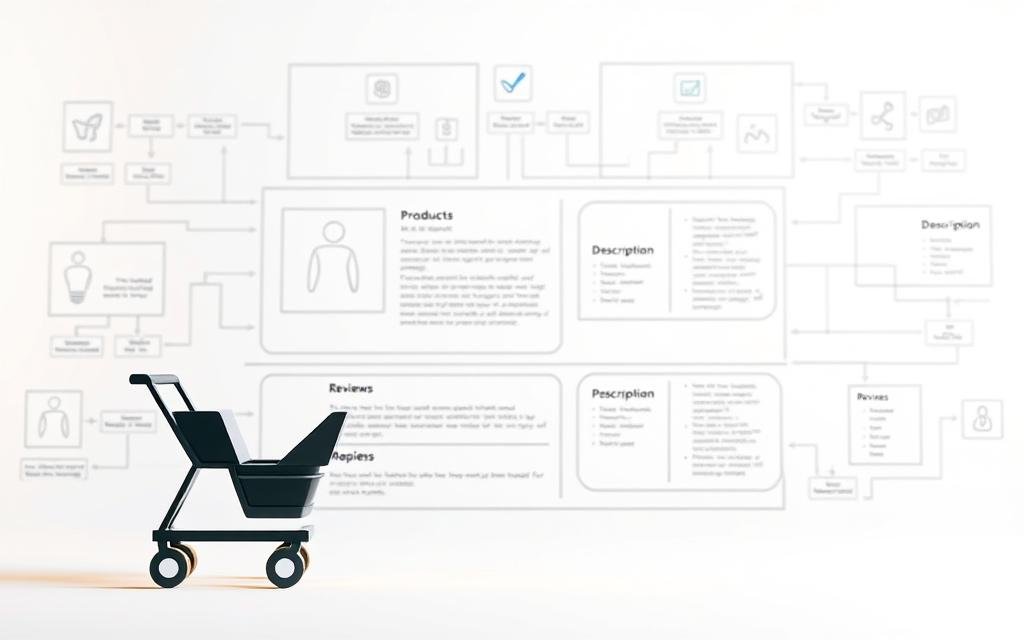Ready to turn local searches into steady sales for your Calgary or Edmonton store? We ask this because many Alberta businesses waste money on ads while missing simple wins that lift organic traffic over time.
We write from our experience at AlbertaRank to show how focused E-commerce SEO and practical site work bring shoppers to your website without constant ad spend. This guide maps keyword planning, content fixes, and product page tweaks that help stores appear in search results when buyers are ready.
Our approach is lean and results-first. We explain easy, measurable steps that fit the limited time most small businesses have, and we share proof that disciplined organic programs can beat paid channels over time. Contact AlbertaRank in Calgary for a local consult at 403 671 3278, Mon–Fri, 9am–5pm.
Key Takeaways
- Aligned pages and the right keyword focus bring qualified search traffic.
- Optimized product content and site structure reduce reliance on ads.
- Organic traffic compounds over time, protecting margins for Alberta businesses.
- We use a lean, measurable process built for Calgary and Edmonton stores.
- Practical steps in this guide save time and target the pages that drive revenue.
Why E-commerce SEO matters now for Alberta online stores
Search results are changing fast, and Alberta stores that adapt their pages win the clicks that matter.
We see two clear paths for Calgary and Edmonton retailers: pay to play or build a durable organic channel. Paid ads bring speed but stop the moment budgets end. Organic work on your site and category templates compounds over time and can outperform paid by large margins.
Where to focus first:
- Category and key product page templates that capture broad queries.
- Titles, meta descriptions, and structured data to stand out above shopping modules.
- Local cues (Calgary, Edmonton, province availability) to attract nearby potential customers.
Data shows top organic positions pull far more clicks than lower slots. That makes improving rankings for pivotal keywords a high-value investment for any small store. We help Alberta businesses get measurable gains without big-agency retainers.
| Focus area | Immediate action | Expected benefit |
|---|---|---|
| Category pages | Refine titles and add local modifiers | Higher visibility for broader queries |
| Product pages | Unique descriptions + structured markup | Better CTR and rich results |
| Site templates | Fix internal links and template copy | Faster authority transfer and scaling |
User intent in ecommerce search: mapping queries to pages that convert
Mapping buyer intent to the right page type turns random visits into predictable conversions for Alberta retailers.
We define intent practically so Calgary and Edmonton teams can tag queries as commercial or transactional and act fast.
Commercial queries (for example, “best winter boots Calgary”) fit comparison posts and buyer’s guides. These pages educate and nudge users toward choices.
Commercial vs. transactional keywords for Alberta buyers
Transactional queries (for example, “buy winter boots Edmonton”) must land on product or category pages with price, availability, filters, and reviews.
We recommend using Semrush to check intent labels and PKD. For new domains aim for PKD under 30 for faster wins.
Aligning intent with product pages, category pages, and blog content
Template design should mirror intent: transactional pages highlight stock, shipping, and CTAs. Commercial pages focus on comparisons and guides with internal links into relevant product pages.
- Tag keywords in a simple spreadsheet to map keyword → page type → conversion goal.
- Use local modifiers and seasonality (cold-weather gear timing) to match demand.
- Avoid sending buying queries to thin blog posts—mismatches reduce conversions and hurt rankings.
Example: “best insulated work gloves” is commercial. We place it in a roundup with CTAs that link to the related product pages.
Checklist: ensure each high-priority keyword has a purpose-built destination, clear CTA, and tracking to measure traffic and conversions.
E-commerce SEO keyword research made practical
Begin by capturing live product demand with simple autocomplete tests on Google and Amazon. That quick step surfaces real buying phrases Calgary and Edmonton shoppers use.
Using Google and Amazon autocomplete to uncover product-focused terms
Start with Google search autocomplete and related searches to harvest long-tail keyword ideas. Then mirror the same tests on Amazon and browse category filters for product category phrases buyers use when they are close to purchase.
Validating volume, intent, and difficulty
Use Google Keyword Planner to check volume and commercial intent. Semrush’s Keyword Magic reveals variants and seasonal swings. Aim for PKD under ~30 for new Alberta sites so your pages can gain rankings sooner.
Competitor mining: finding gaps
- Run Semrush Organic Research to spot competitor product terms you don’t have.
- Prioritize by fit, intent, margin and PKD.
- Group keywords by category and target page to speed on-page work.
| Step | Tool | Outcome |
|---|---|---|
| Harvest | Google + Amazon | Long-tail product keywords |
| Validate | Keyword Planner | Volume & intent |
| Mine | Semrush | Competitor gaps |
We can run this research for your Calgary or Edmonton store and deliver prioritized keyword lists, mapped to product and category pages on your site.
Choosing profitable keywords: volume, fit, intent, and competition
Not all high-volume searches pay the bills. We focus on terms that match your inventory, margins and buyer intent in Calgary and Edmonton.

First, we assess keyword-product fit so pages attract buyers, not tire-kickers. Fit matters more than raw volume: an imperfect match drives clicks but poor conversion.
Keyword-product fit to avoid tire-kickers
We score each keyword against product availability, price band and buyer intent. This keeps your content and product pages aligned with what shoppers expect.
Personalized difficulty and realistic rankings for new sites
We use Semrush PKD and a domain-specific difficulty estimate to set achievable targets for new sites. That helps us stage work into sprints and show momentum.
- Rank by fit: prioritise terms that match products and margins.
- Balance volume vs competition: avoid vanity keywords that cost time without revenue.
- Plan bridge content: use comparison pages only after high-fit pages are live.
- Forecast impact: document assumed CTR and conversion to estimate traffic and revenue.
We revisit the shortlist every quarter as PKD, competition, and search behaviour change. That keeps your site focused on terms that deliver real ROI over time.
Building an SEO-friendly site architecture for ecommerce
A flat, predictable structure lets Alberta stores add lines without breaking link flow.
We design sites so every product is reachable within three clicks from the homepage. This improves crawlability and helps users move from browse to buy quickly.
Flat, scalable structure: keep every product within three clicks
Keep click depth shallow. Deep hierarchies dilute authority because most external links point to the homepage. A PetSmart-style path—Home > Dog > Bowls & Feeders > Product—works well for indexing and conversions.
Internal navigation that moves link equity to category and product pages
We concentrate link authority on priority category and product pages via main navigation, footer links, and contextual modules. Breadcrumbs and logical URLs show users and engines where they are.
“Most external links land on the homepage; internal flow decides which product pages rank.”
- Scalable templates that let you add categories without a rebuild.
- Related categories and featured collections to pass authority laterally.
- Internal linking from blog content to speed indexing of product pages.
| Action | Why it matters | Quick win |
|---|---|---|
| Three-click rule | Better crawl depth and conversions | Audit click depth monthly |
| Priority links | Concentrates authority on selling pages | Add nav and footer links |
| Scalable templates | Easy category expansion | Use reusable category templates |
On-page optimisation for category pages
Category pages are the front door for many Alberta shoppers; make that first impression convert. We focus metadata and page copy to match local search intent and drive clicks from google search results.
Title tags with click magnets and long-tail modifiers
We craft title tags under ~60 characters that combine the primary keyword with a long-tail modifier and a value prop. Examples include “Winter Boots Calgary — 25% Off | Free Shipping Canada” or “Work Gloves Online — Lowest Price Edmonton.”
- Keep titles concise. Add city or province when useful.
- Include click magnets like “Free Shipping,” “Lowest Price,” or “Limited Stock.”
- Never duplicate titles across category pages to avoid cannibalization.
Meta descriptions that boost CTR in Canadian search results
Descriptions around 105–120 characters read well on Canadian SERPs. We write persuasive snippets that show availability across Alberta and unique differentiators.
- Highlight: brands carried, sustainability, or local pickup in Calgary/Edmonton.
- Show intent cues: filters, price ranges, and stock signals to match user goals.
- Test seasonal variants and monitor CTR and rankings to refine phrasing.
“Optimised snippets increase click-through and send stronger relevance signals to potential customers.”
We also add schema where applicable and preview snippets to ensure they read well on google search. Regular CTR tests and small copy tweaks often lift traffic and results for category pages.
On-page optimisation for product pages
We recommend quick template changes that Shopify and Woo teams can deploy in a single sprint to gain measurable wins.
Start by replacing manufacturer copy with unique product names and a short benefits lead. Then add a concise features list and a longer persuasive description below the fold.
Unique product content that reduces duplicate content risk
Unique copy helps pages rank for long-tail product keywords and avoids duplicate content penalties. Use a clear product title, a 2–3 line highlight, and a feature bullet set.
Keep the long description helpful and local where relevant — mention Calgary or Edmonton availability when it matters.
Image optimisation, alt text, and SEO-friendly URLs
Name image files with descriptive, hyphenated words and compress them to preserve load speed. Add alt text that describes the product and includes a keyword naturally.
- Use short, lowercase, hyphenated URLs that match the product title.
- Include review snippets and stock messages to boost CTR in search results.
- Add internal links to parent categories and related products to pass authority.
Track page-level rankings and engagement and iterate. Test title and meta variants to improve click-through rate for Canadian shoppers. Small template tweaks often drive the best return on time invested.
Internal linking strategies that lift rankings and revenue
A thoughtful linking strategy nudges users deeper into your site while passing authority to key category pages. We build modules that both help search relevance and grow average order value for Alberta stores.
Related items, “buy the look,” and cross-sells that users love
We design related items, cross-sells and buy the look bundles to create personalised journeys. These modules point visitors to priority category pages and product pages that convert.
- Curated logic: tune links by collection, price band and seasonality for Calgary and Edmonton shoppers.
- Editorial blocks: add “Top picks for Calgary winters” linking to curated categories.
- Blog to product: embed contextual links from articles to transactional pages to speed indexing.
- Anchor text: keep it descriptive and natural to avoid keyword stuffing.
- Breadcrumbs: use engine-friendly trails to spread authority and aid navigation.
We monitor click patterns and revenue per module, reviewing link depth quarterly to ensure no key page drifts from your authority hubs.
| Module | Primary goal | Quick metric |
|---|---|---|
| Related items | Increase AOV | Avg. items per order |
| Buy the look | Boost conversions | Conversion rate |
| Editorial blocks | Pass authority | Page views to category |
Technical SEO essentials for ecommerce sites
A fast, secure site makes the difference between a browse and a sale for Alberta stores. We focus on technical wins that boost page performance and indexing so your product pages appear for the right keywords.
Core Web Vitals, HTTPS, and fast-loading product media
Implement HTTPS everywhere and resolve mixed content to build trust for Calgary and Edmonton shoppers.
Optimise Core Web Vitals—LCP, INP, CLS—by compressing images, deferring non-critical scripts, and serving next-gen formats. Lazy-load galleries and use a CDN for fast product media.
Stabilise layout shifts on product pages by setting fixed image dimensions and limiting dynamic injections from apps.
Submitting sitemaps and monitoring indexing in Google Search Console
Validate canonical tags, robots.txt and XML sitemaps. Submit sitemaps in Search Console and monitor coverage reports daily for crawl errors and redirect chains.
Fix orphaned pages and streamline theme code so critical pages load quickly and pass authority through clean URL structures and breadcrumbs.
“Technical wins improve crawlability and UX, lifting engagement and rankings.”
| Task | Developer action | Quick check |
|---|---|---|
| HTTPS & mixed content | Force HTTPS, update asset URLs | No mixed content in browser console |
| Core Web Vitals | Compress images, defer scripts, enable CDN | LCP & CLS within target |
| Sitemaps & indexing | Submit sitemap, monitor Search Console | No high-priority crawl errors |
| Canonicalisation | Set canonical tags, fix redirects | Single canonical per page |
| Maintenance cadence | Monthly audits and deployment checks | Performance baseline preserved |
Checklist to hand developers:
- Enable HTTPS, resolve mixed assets.
- Compress and lazy-load product images; use CDN.
- Run Core Web Vitals lab and field tests; fix LCP/INP/CLS.
- Submit/validate sitemaps in Search Console; fix coverage issues.
- Confirm canonical tags, clean URLs and breadcrumb trails.
- Document monthly technical audits to protect gains.
Structured data: product schema that earns rich results
A few lines of correctly formatted schema can make your product page stand out on Google.
We implement Product structured data so snippets can show ratings, price, availability and brand. This often lifts click-through rates on product pages and relevant category pages.
Keep markup truthful: schema must match on‑page content and live inventory. Mismatches trigger warnings and reduce trust.

Ratings, price, availability, and how to validate markup
Use a trusted generator (for example, Merkle) to build JSON-LD with fields for name, brand, price, priceCurrency, availability and aggregateRating.
- Deploy via theme templates or Tag Manager so every new product inherits the pattern.
- Validate with the Schema Markup Validator and monitor the Enhancements report in Search Console.
- Add Breadcrumb and Organization schema to strengthen entity signals site-wide.
“Rich snippets are a clear, achievable win for Alberta stores when data is accurate and validated.”
| Markup item | Why it matters | Quick check |
|---|---|---|
| AggregateRating | Displays stars and review count in search results | Matches on-page reviews |
| Offer (price & availability) | Shows pricing and stock status to shoppers | Syncs with inventory feed |
| Brand & GTIN | Helps engines identify products reliably | Use manufacturer data |
| Breadcrumb & Organization | Improves site context and entity signals | Valid in Schema Markup Validator |
Content marketing that supports the funnel
Good content moves ready buyers from interest to checkout. We build tactical BoFu posts—comparisons, “best of” roundups and customer stories—that feed directly into product and category pages. These pieces target commercial keywords and are written to convert Alberta shoppers in Calgary and Edmonton.
BoFu roundups, comparisons, and customer stories that drive sales
Roundups and head-to-head comparisons catch buyers who are choosing between products. We link each mention to the correct product page and add clear CTAs so the path to purchase is one click away.
Customer stories add trust. Short case studies from local customers show real outcomes and help convert cautious users into customers. We refresh lists with new product options to keep pages relevant and ranking.
Promotion via social and email to diversify organic traffic
We amplify content via social channels and email so the site does not rely solely on search. Snippets are repurposed for Instagram, Facebook, TikTok, LinkedIn, YouTube and X to reach potential customers where they spend time.
- Measure impact: track assisted conversions from content to prove revenue contribution.
- Localise topics: plan calendars around Alberta seasonality (winter gear, back-to-school).
- Optimize feeds: A/B test headlines and images for higher CTR from social and newsletters.
“Good BoFu content links directly to product and category pages and is promoted broadly to diversify traffic sources.”
Google Merchant Center: product feeds that enhance discoverability
We use Merchant Center to make product listings appear across Google quickly and reliably. Verifying your website and claiming the URL is the first step that links your site to Google’s retail ecosystem.
After verification we submit feeds with complete attributes—titles, descriptions, price, availability and GTIN/MPN—via spreadsheet or XML. Google reviews new accounts in about three business days.
Verification, feed submission, and issue remediation
- Verify site ownership and claim the URL so product data maps to your site.
- Prepare feeds with full attributes and schedule regular fetches to keep pages fresh.
- Monitor the dashboard and the Needs attention tab for price mismatches, missing identifiers, or availability errors.
- Align product titles with your keyword strategy to boost discoverability in free listings.
- Link Merchant Center with Google Ads to test paid Shopping while organic listings build.
We set Canadian shipping and tax settings and add diagnostic alerts so feed health stays stable as inventory changes. We also document a short remediation checklist your team can follow.
“Timely fixes to disapprovals turn blocked items into visible listings and measurable traffic.”
| Action | Why it matters | Quick check |
|---|---|---|
| Claim URL | Connects listings to your site | Verified in Merchant Center |
| Full feed attributes | Meets policy and unlocks rich info | No missing GTIN/price |
| Scheduled fetch | Keeps product pages current | Recent fetch timestamp |
| Diagnostics alerts | Prevents long outages | Zero unresolved disapprovals |
| Performance tracking | Shows incremental reach | Clicks & impressions monitored |
Need help? We can assist end-to-end—verification, feed build, and remediation—so your Calgary or Edmonton store starts earning free listings and measurable results fast.
Managing duplicate content and canonicalisation
A simple canonical and noindex policy saves crawl budget and keeps your best pages focused.
We map where duplicate content appears — product variants, sort parameters, and pagination — and mark a single master with a canonical tag. This preserves the site’s ranking signals and prevents diluted relevance for category pages.
Hreflang for regional pages and smart noindex decisions
Hreflang tells engines which regional or language version to serve. If you target Calgary and Edmonton separately, implement hreflang so users see the right page.
- Apply noindex to thin, non-commercial pages (thank-you, checkout, account pages).
- Audit canonical chains and fix redirects so each chain resolves to one canonical URL.
- Keep filters crawl-friendly: use parameter handling or canonicalise filter combinations to avoid infinite URLs.
| Action | Why it matters | Quick check |
|---|---|---|
| Canonical tags | Concentrate signals on master pages | One canonical per page |
| Noindex low-value pages | Protect crawl budget | Noindexed pages not in sitemap |
| Hreflang | Serve correct regional content | Validated in crawls |
“Validate changes with crawls and update sitemaps to include only indexable, canonical URLs.”
Finally, align internal links to canonical targets so link equity flows predictably. We validate in Search Console and crawling tools to confirm engines understand your preferred structure.
Analytics and measurement for ecommerce SEO
We link ranking signals to real sales so Alberta owners see which work drives revenue.
Start with a dashboard that ties rankings, organic sessions and revenue together. We combine Search Console queries, clicks and coverage data with analytics sessions and transaction revenue. That shows which keyword moves actually put dollars in the bank.

Tracking rankings, organic revenue, and Search Console insights
We monitor Google Search Console for query trends, impressions and coverage issues that affect visibility. Then we map those signals to category pages and key product page cohorts so work is measurable.
- Dashboards: rankings + traffic + revenue to show impact.
- Segmentation: region filter for Calgary and Edmonton performance.
- PKD context: set realistic timelines based on keyword difficulty.
“Rankings matter, but dollars in the bank matter most for Alberta businesses.”
We run controlled tests on titles, descriptions and modules, tag BoFu content to capture assisted conversions, and keep UTMs and annotations clean so reports stay reliable.
| Metric | Source | Why it matters |
|---|---|---|
| Rankings | Rank tracker | Shows visibility vs competitors |
| Clicks & Impressions | Search Console | Leading indicators of demand |
| Organic revenue | Analytics | Direct business impact |
| Coverage & Enhancements | Search Console | Fixes that restore visibility |
| CTR tests | Analytics + GSC | Improves traffic quality and conversions |
Why we are different: AlbertaRank.ca for targeted, local results
We partner with Alberta retailers to turn search intent into steady customers. Our work is practical, measurable and built for Calgary and Edmonton realities.
Results-oriented work without big-agency fluff or overhead.
Results-oriented services that focus on ROI
We cut the layers and give you direct access to strategists who prioritise the pages that matter. That means clear roadmaps, fast communication and measurable goals tied to revenue.
Local expertise for Alberta online stores
We know seasonality, shipping and regional search patterns. Our plays are tuned to Calgary and Edmonton so your site and content serve nearby buyers when they are ready.
Contact AlbertaRank — Calgary, AB
Call: 403 671 3278 — Mon–Fri, 9am–5pm. Visit: AlbertaRank, Calgary, AB T3N 1J5 for a discovery session.
- We operate as your Alberta partner—every dollar works harder for your business.
- Right-sized engagements for SMB budgets, no bloated retainers.
- We coordinate with your devs to implement changes quickly and safely.
“We share progress and next steps plainly—no fluff—so you always know what’s happening and why.”
Follow us on Instagram, Facebook, TikTok, LinkedIn, YouTube and X for Alberta-focused tips and updates.
E-commerce SEO: step-by-step execution for sustainable growth
Turn discovery into action by mapping each keyword to one page and one conversion step.
We begin with quick research using Google and Amazon autocomplete, then expand terms with Semrush and validate volume in Google Keyword Planner. That gives the keyword list and PKD priorities to target quick wins for new sites in Calgary and Edmonton.
Next, we implement a flat site architecture so category and product pages sit within three clicks of the homepage. This structure speeds indexing and concentrates authority where it matters.
On-page work includes compelling titles, concise meta descriptions, structured copy and product schema. We add breadcrumb markup and deploy internal linking modules—related items and editorial anchors—to pass authority and improve discovery.
Technical seo checks finish the sprint: HTTPS, Core Web Vitals fixes, clean sitemaps and Search Console indexing. We verify Merchant Center feeds and fix disapprovals so products stay discoverable.
Finally, we publish BoFu content, promote via social and email, and track rankings and revenue. We iterate fast and scale winning page templates across categories.

| Step | Action | Quick outcome |
|---|---|---|
| Research | Google/Amazon autocomplete → Semrush → GKP | Prioritised keywords & PKD |
| Structure | Flat site architecture & breadcrumbs | Faster indexing, focused authority |
| On-page & Schema | Titles, meta, product schema, on-page seo | Higher CTR and rich results |
| Technical & Measurement | HTTPS, Core Web Vitals, Merchant Center, analytics | Stable indexing and measurable revenue |
“We deliver a repeatable playbook your team can run, or we can execute it for you end-to-end.”
Conclusion
Closing the loop, a clear plan turns site work into steady traffic and measurable sales.
We recap the Alberta-ready roadmap: research buyer intent, pick profitable keywords, build a flat site structure, and optimise category pages and product pages for conversion.
Consistent execution and measurement drive durable rankings in search results. Start with the pages that impact revenue, then expand into supporting content like blog posts and comparisons.
Clean technical foundations, correct schema and smart internal links compound over time and make every update more effective.
Want help? We’re in Calgary, Mon–Fri 9–5. Call us to map next steps and turn your products into more clicks, customers and long-term growth.
FAQ
What is AlbertaRank’s approach to Alberta SEO for online stores?
We focus on local-first search strategies that drive organic traffic to Calgary and Edmonton stores. That means tailored keyword research, site architecture that helps users and search engines, and content that matches buyer intent across category pages, product pages, and blog posts.
How does organic traffic compare to paid ads for Alberta businesses?
Organic traffic builds sustainable visibility and trust with potential customers, while paid gives immediate results. We prioritise search-first tactics so your site earns clicks over time, reducing reliance on ads and improving long-term return on investment.
How do recent SERP changes affect product and category pages?
Google’s updates reward helpful, intent-aligned pages. That raises the bar for unique product content, structured data like product schema, and clear internal linking. Pages that match commercial and transactional keywords perform best in local search results.
How do we map user intent to pages that convert?
We classify queries as commercial, transactional, or informational, then map them to category pages, product pages, or blog content. This reduces bounce rates and raises conversions by sending Alberta buyers to the page that answers their need.
What’s the difference between commercial and transactional keywords?
Commercial keywords show buying interest (e.g., “best snow boots Calgary”), while transactional keywords indicate readiness to purchase (e.g., “buy men’s snow boots online Canada”). We prioritise both for high-value product and category pages.
How do you find product-focused terms quickly?
We use Google and Amazon autocomplete to uncover long-tail modifiers and common queries. Then we validate volume and difficulty with tools like Semrush and Google Keyword Planner to ensure effort matches opportunity.
Can competitor research reveal keyword gaps for Alberta stores?
Yes. Organic Research reports uncover competitors’ top pages and traffic-driving keywords. We mine those reports to find gaps you can rank for, especially localised terms and niche product phrases.
How do you choose profitable keywords for a new store?
We assess volume, intent, competition, and how well a keyword fits a product. For new sites we prioritise lower-difficulty, high-fit keywords that attract buyers, avoiding broad terms that bring tire-kickers.
What site architecture works best for online stores?
A flat, scalable structure keeps products within three clicks of the homepage. This improves crawlability, distributes link equity to category and product pages, and helps search engines index your inventory faster.
How should internal navigation be set up to boost rankings?
Use clear category pages, breadcrumb trails, and related-item blocks. Internal links should push authority to priority category and product pages, improving discoverability and conversion paths.
What on-page elements lift category page performance?
Strong title tags with long-tail modifiers, unique meta descriptions that boost CTR, well-structured headings, and localised content help category pages rank and attract clicks in Canadian search results.
How do I avoid duplicate content on product pages?
Write unique product descriptions, use canonical tags when necessary, and add user-generated content like reviews. These steps reduce duplicate content risk and improve relevance for each product.
What image and URL practices help product page visibility?
Optimise images for fast loading, use descriptive alt text, and create clean, keyword-friendly URLs. These technical and on-page tweaks improve user experience and search performance.
What internal linking patterns increase revenue?
Implement related items, “buy the look” bundles, and cross-sells on product pages. These features keep users browsing and increase average order value while signalling relevance to search engines.
Which technical priorities should Alberta stores fix first?
Focus on Core Web Vitals, HTTPS, image compression, and fast-loading product media. Also submit sitemaps and monitor indexing in Google Search Console to ensure pages are discoverable.
How do I use product schema to earn rich results?
Add structured data for ratings, price, availability, and SKU. Validate markup with Google’s Rich Results Test so your product snippets can show up with enhanced features in search.
What content types support the sales funnel for local buyers?
Create bottom-of-funnel roundups, product comparisons, and customer stories. Promote this content via social and email to diversify traffic and guide shoppers toward conversion.
How does Google Merchant Center fit into discoverability?
Merchant Center feeds products into Google Shopping. Verify your site, submit a clean feed, and fix feed issues promptly to increase product visibility for transactional queries.
When should I use hreflang or noindex tags?
Use hreflang for region-specific pages to prevent regional content overlap. Apply noindex to faceted or duplicate results that add little value to users to keep your index focused on commercial pages.
What metrics should Alberta stores track for performance?
Track organic revenue, conversion rate, rankings for target keywords, and Search Console insights like impressions and clicks. These metrics show whether our optimisations drive real business results.
How is AlbertaRank different from a big agency?
We deliver results-oriented, local expertise without big-agency overhead. Our team focuses on Calgary and Edmonton retailers with hands-on strategies that drive traffic, conversions, and measurable growth.
How can I contact AlbertaRank for help?
Reach us at AlbertaRank — Calgary, AB — 403 671 3278, Monday to Friday 9–5. Follow us on Instagram, Facebook, TikTok, LinkedIn, YouTube, and X for tips and case studies.


